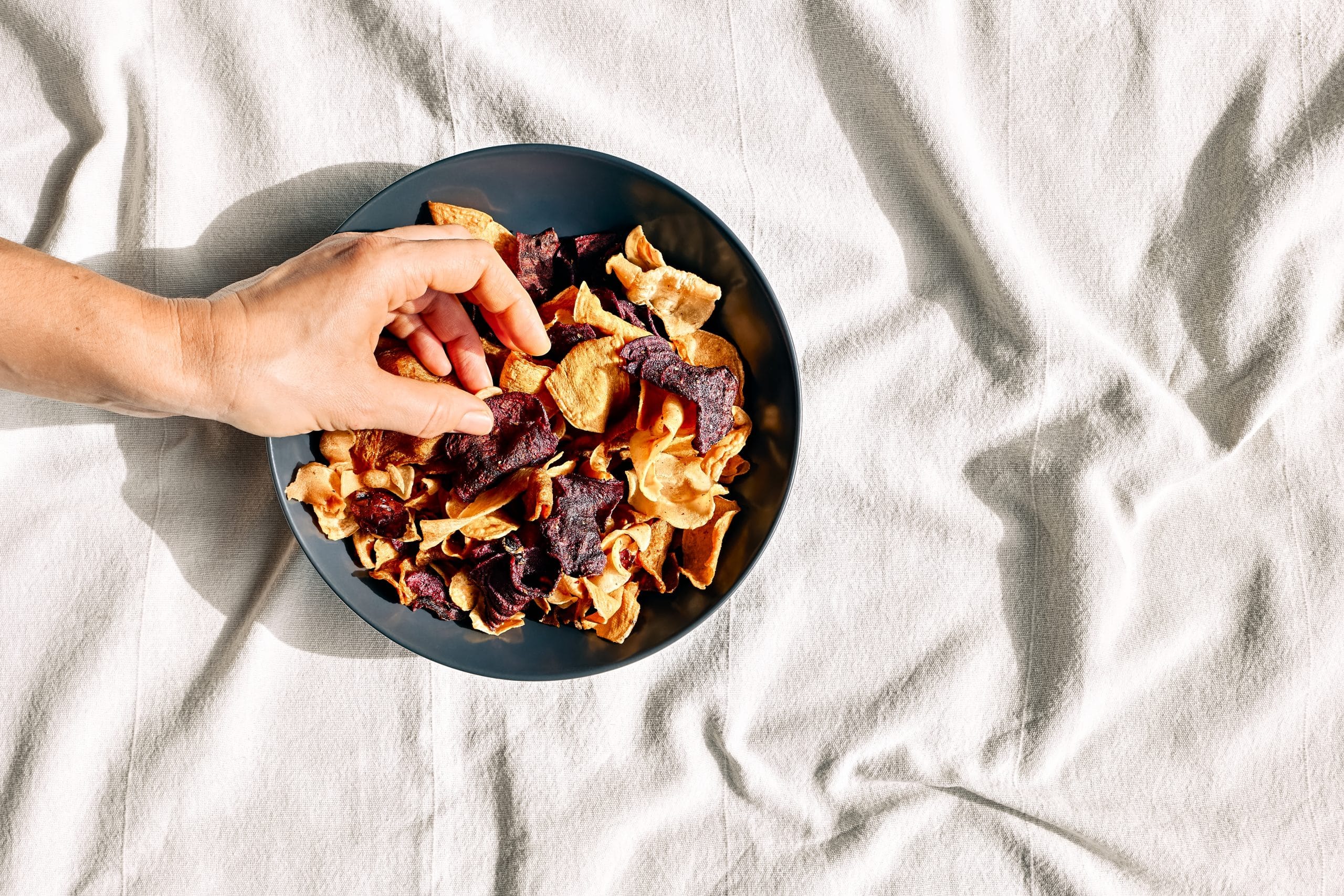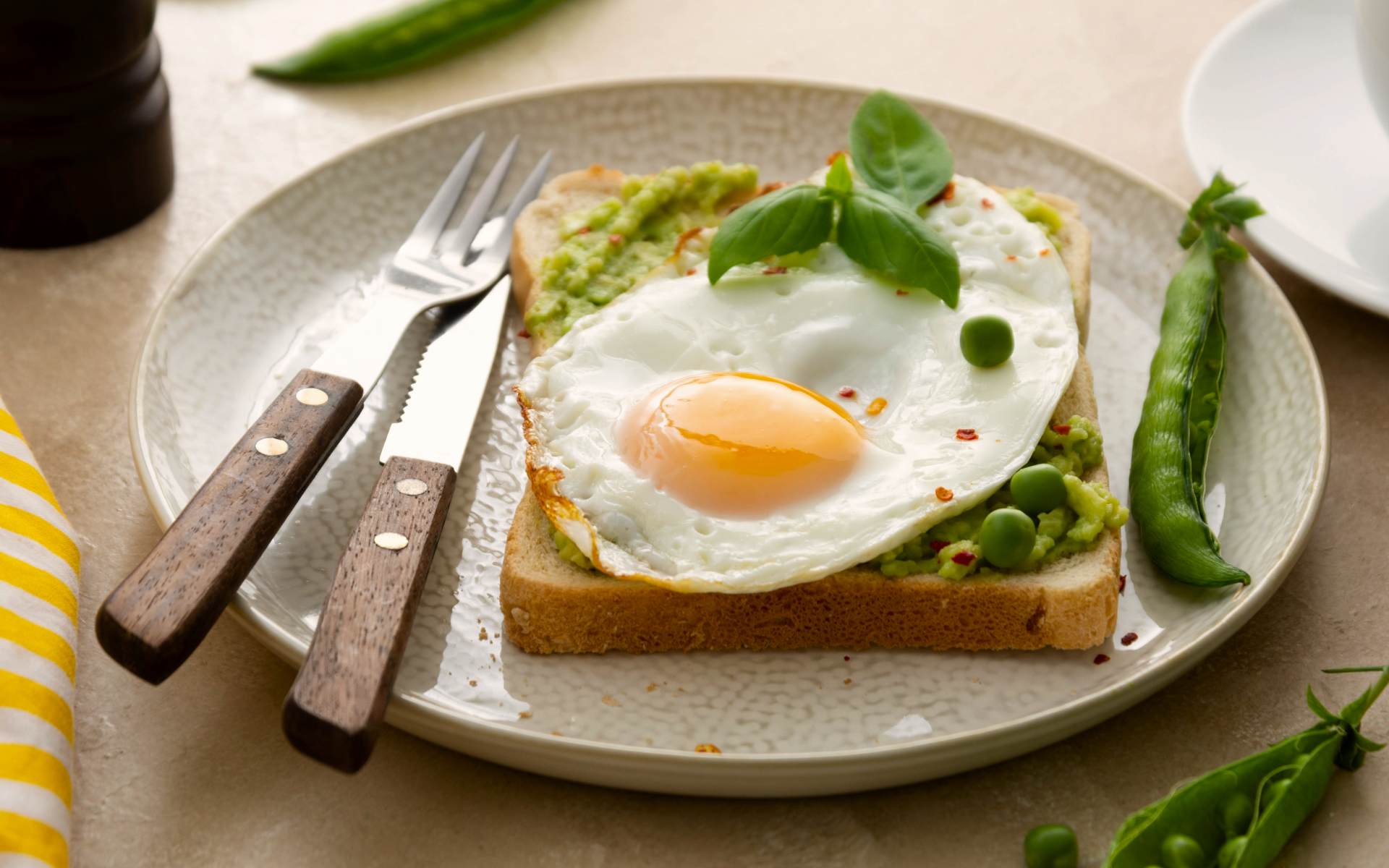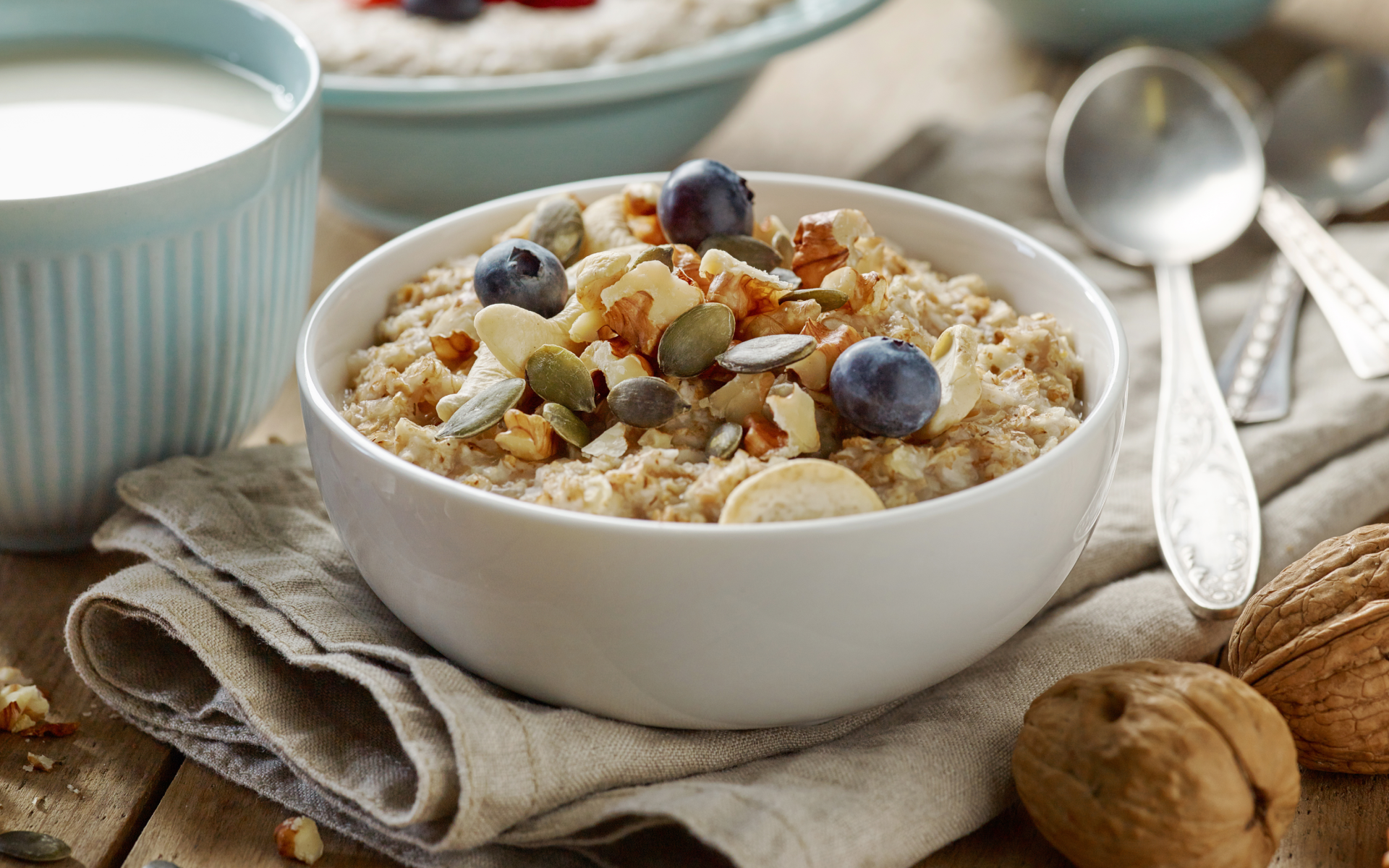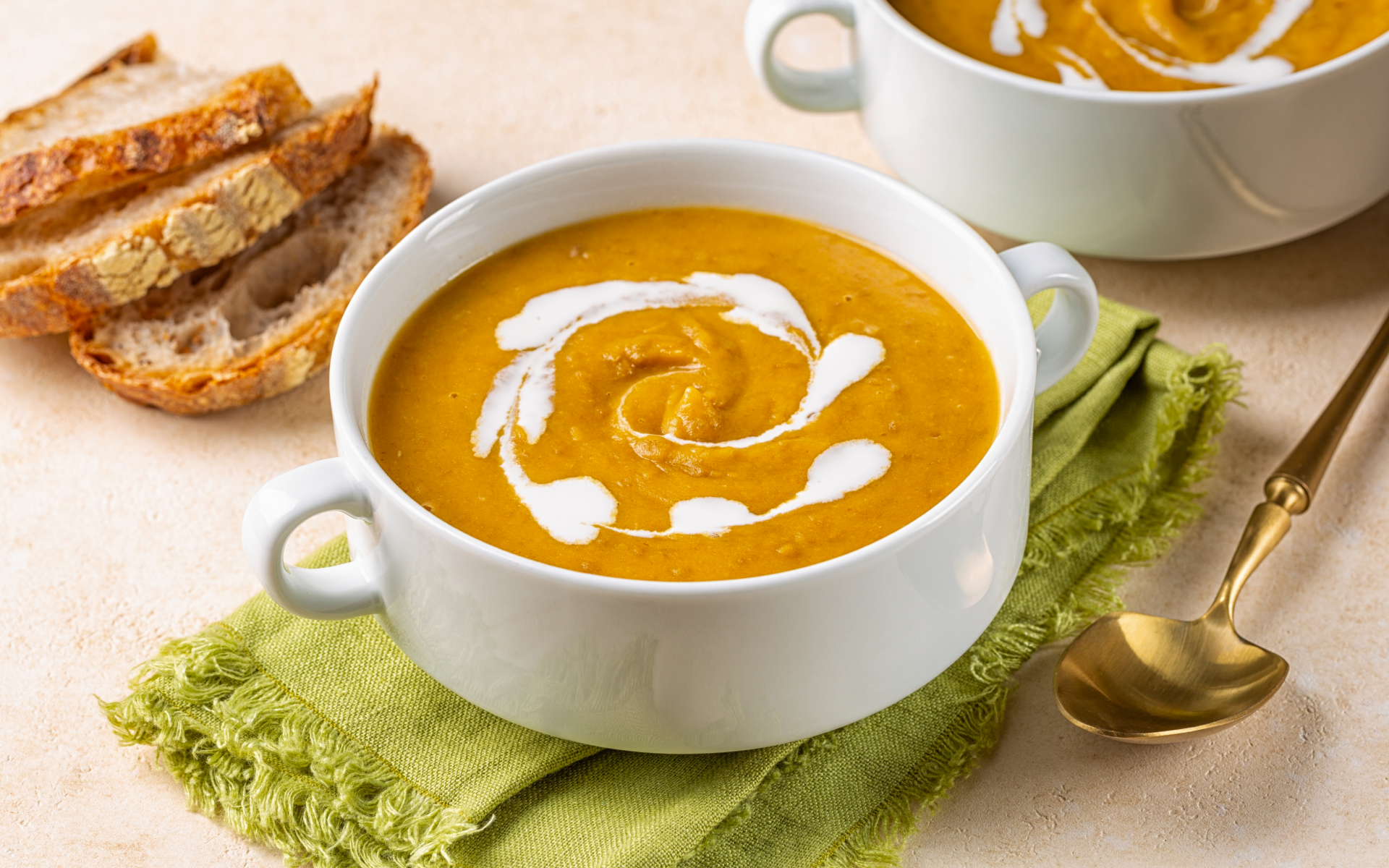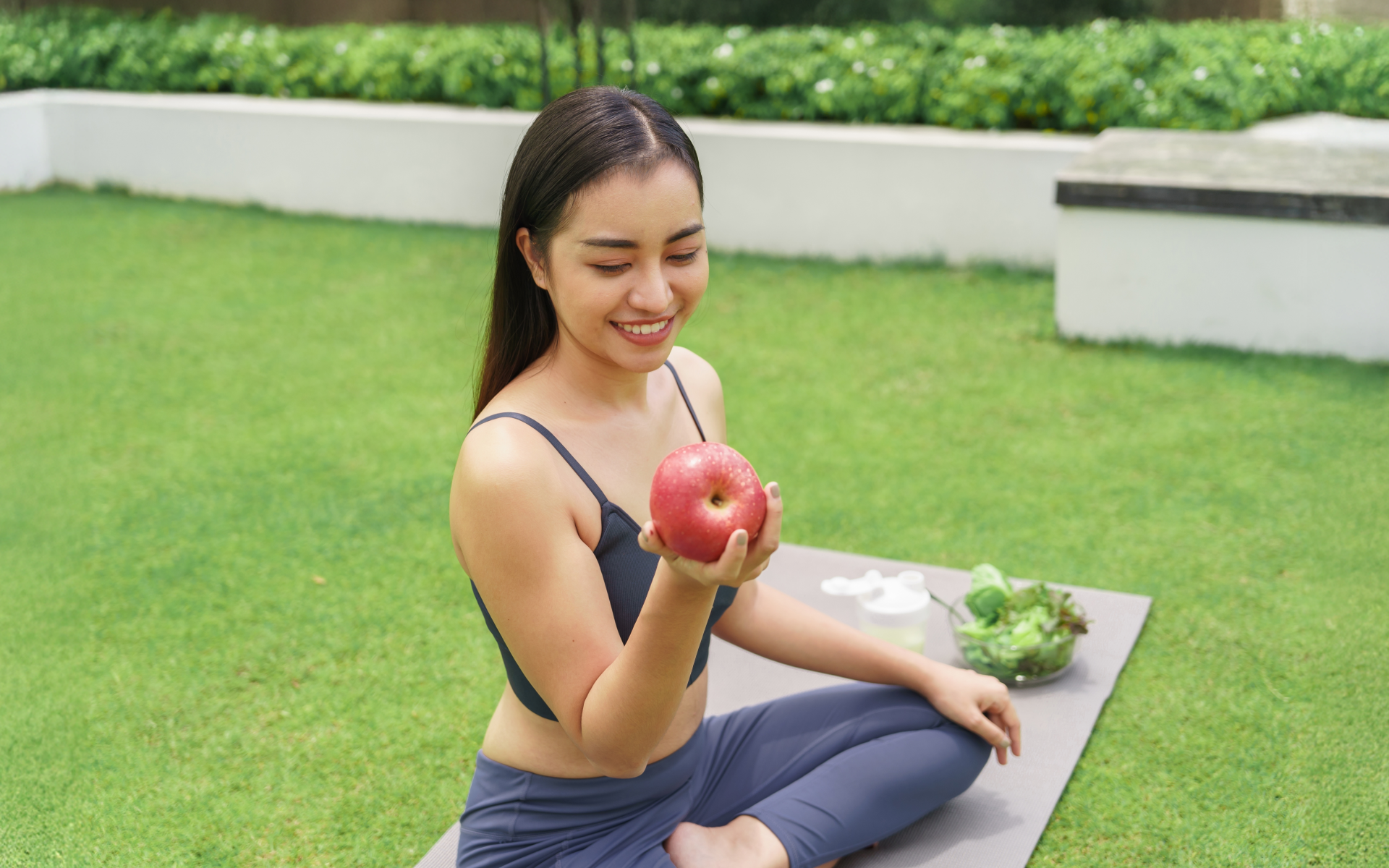When you’re hungry but trying to stay on the healthier side of snacking, veggie chips seem like the perfect solution, right? You might think they’re the best alternative to potato chips or other salty snacks.
But like with most things that sound too good to be true, veggie chips aren’t always as they seem. Packaged and marketed to make you feel better about your snack choices, they ride the wave of “health food” trends.
Yet, the question remains: Are veggie chips genuinely a healthier option, or should you steer clear and seek out whole vegetables instead? Which one is the best way to enjoy the benefits of vegetables without missing out on the joy of snacking?
Here’s what you need to know to make informed decisions about incorporating veggie chips into your diet.
What Are Veggie Chips Made Out Of?
Veggie chips are made from a variety of vegetables through processes such as baking, dehydrating, or frying, and are often seasoned for enhanced flavor. Here’s a detailed look at what veggie chips are typically made from:
Primary Ingredients:
- Root Vegetables: The most common base for veggie chips includes root vegetables like sweet potatoes, beets, carrots, parsnips, and taro. These vegetables are chosen for their natural sweetness, earthy flavors, and their ability to crisp up nicely when cooked.
- Leafy Greens: Some veggie chips are made from leafy greens like kale or spinach, which are known for their nutritional benefits. These types of chips are usually baked or dehydrated to achieve a crispy texture.
- Legumes: Certain varieties of veggie chips are made from legumes such as green peas or black beans. These provide a different texture and are often loaded with protein.
Cooking Methods:
- Baking: Many veggie chips are baked to reduce the oil content, making them a lower-fat option than traditional fried chips. Baking may also help to retain more of the original nutrients found in the vegetables.
- Dehydrating: Dehydration is another method used to make veggie chips, especially those made from leafy greens. This slow process removes water content while concentrating the vegetable’s natural flavors and nutrients.
- Frying: Some veggie chips are fried, similarly to regular potato chips. Frying provides the crunchiest texture but can add to the calorie count.
Seasonings and Additional Ingredients:
- Seasonings: To enhance the taste, veggie chips are often seasoned with a variety of spices and herbs such as sea salt, paprika, garlic powder, or vinegar powder. Natural flavorings might also be added for an extra taste kick.
- Oil: Oil is used in the cooking process, especially for fried and some baked varieties. Healthier oils like olive oil or avocado oil are preferred for their better nutritional profile, but are more expensive and sometimes are not as heat stable as other oils (8).
- Preservatives: To increase shelf life, some commercial veggie chips contain preservatives, though many brands strive to keep their products as natural as possible.
If you struggle to even flirt with the idea of giving up your favorite foods or working out till your legs give way – BetterMe app is here to breathe a fresh perspective into the way you view the weight loss process! Check out the app and experience the fun side of fitness and dieting with BetterMe!
Can Vegetable Chips Be Healthy?
Vegetable chips may provide a more nutritious snacking option compared to traditional chips, They contain dietary fiber, vitamins, and minerals inherent to the vegetables they’re made of (7) (16).
However, it’s still wise to consume them in moderation and pay attention to the ingredient list and nutritional information. Why? Because:
Nutritional Value Varies By Brand
Not all veggie chips are created equal. Some may contain more vegetables and fewer additives, while others might use a higher oil content or excessive salt to enhance their flavor. It’s important to compare different brands and read the nutritional information to be sure you’re making the healthiest choice.
Some Nutrients May Be Lost During Processing
While many nutrient-dense vegetables are used to make veggie chips, some nutrients may be lost during the processing and cooking methods (4) (11). For example, frying can significantly reduce the antioxidant levels in vegetables, while dehydrating can remove water-soluble vitamins.
Added Flavors And Preservatives
Some veggie chip brands may use artificial flavors or preservatives to enhance taste and shelf life. These additives may not provide any nutritional benefits and some people like to limit foods that contain them (2) (5).
Portion Control Is Challenging
The ease of consuming veggie chips can often lead to overeating. Unlike whole vegetables, which can be filling due to their high fiber and water content (9), veggie chips are more densely packed with calories and less satisfying. This makes it easy to eat large amounts without realizing, potentially leading to calorie overconsumption.
Cost Comparison with Whole Vegetables
Veggie chips tend to be more expensive than purchasing whole vegetables. When you buy veggie chips, you’re paying for the processing, packaging, and branding.
In contrast, whole vegetables not only offer better nutritional value but are also more cost-effective in the long run. Investing in whole vegetables for snacking can provide both health benefits and savings (14).
Read more: 16 Vegan Alternatives for Cheese to Transform Any Meal You Crave
Are Veggie Chips Healthier Than Regular Chips?
Veggie sticks aren’t necessarily better than potato crisps (12), as it depends on the brand and ingredients used.
Veggie sticks typically consist of a base of potato flour or potato starch mixed with pureed, powdered, or dehydrated vegetables such as spinach, tomatoes, and carrots. These ingredients are then shaped into sticks, extruded, and baked or fried until crispy.
In some cases, they may have lower fat or calorie content compared to regular chips. But the actual vegetable content is usually quite low, and the nutritional profile can be similar to other processed snack foods.
However, as with veggie chips, it all comes down to the brand and ingredients used. Some may contain high levels of added salt and fat, which can make them similar to or even less healthy than some potato crisps. It’s best to compare labels and nutritional information before making a decision.
A good rule of thumb is to most of the time choose snacks made with whole, nutrient-dense ingredients and limited added sugar or salt (6).
Whether you’re a workout beast or just a beginner making your first foray into the world of fitness and dieting – BetterMe has a lot to offer to both newbies and experts! Install the app and experience the versatility first-hand!
What Are The Healthiest Chips?
The healthiest chips are those made from whole, nutrient dense ingredients and cooked using methods that don’t add too much fat or sodium.. Look for chips with a high vegetable content.
Homemade veggie chips are also an excellent option for the health-conscious. They’re easy to make, allowing you to control the ingredients and cooking methods used. You can find a healthy veggie chips recipe to try at home on the internet.
Our blog, Keto Chips Recipe features several delicious, healthy, weight loss friendly chip recipes you will enjoy making and eating.
Since all of us can’t find the time to make our own chips, some brands offer healthier options with a focus on using whole ingredients and limiting additives. It’s always a good idea to read the ingredient list and nutritional information before purchasing.
Here are some tips for choosing healthier chips:
- Look for chips with whole, nutrient-dense ingredients like vegetables and whole grains.
- Avoid chips with excessive added salt or fat.
- Choose baked or dehydrated options instead of fried ones.
- Compare brands and nutritional information to make the healthiest choice.
- Watch out for terms like “veggie-flavored” or “vegetable-infused,” as these may not have a higher vegetable content and might be misleading.
- Watch out for portion sizes and practice moderation when consuming chips.
- Eat whole, minimally processed vegetables as snacks whenever possible.
FAQs
What Is The Benefits of Vegetable Chips?
Vegetable chips may sometimes offer a more nutritious snacking option, compared to traditional chips, providing dietary fiber, vitamins, and minerals inherent to the vegetables they’re made of. They can also be an excellent way to introduce new vegetables into your diet.
Are Dried Vegetables Healthy?
Dried vegetables can be a healthy snack option, as long as they don’t contain too much added salt. . However, some nutrients may be lost during the drying process, and portion control is still necessary.
What Are The Advantages of Vegetable Chips?
Some advantages of vegetable chips include being a convenient and tasty way to incorporate more vegetables into your diet, providing nutritional value from the vegetables they’re made of, and potentially offering a healthier alternative to traditional chips.
They can also be a great option for those looking for gluten-free or vegan snacks. However, you must read labels and choose healthier options in order to reap these vegetable chip benefits.
Is Frying Chips In Vegetable Oil Healthy?
Frying chips in vegetable oil can be a healthier option, compared to other oils like palm oil that are higher in saturated fats (13).
Vegetable oils typically contain polyunsaturated and monounsaturated fats, which can help lower cholesterol levels and reduce the risk of heart disease (8). However, it’s still considered a high-fat and high-calorie cooking method, so moderation and portion control are crucial for overall health.
Furthermore, frying could potentially lead to the formation of unhealthy compounds if the oil is overheated or reused multiple times (10). It’s ideal to choose baked or dehydrated options whenever possible.
Are Veggie Straws Healthier Than Chips?
Veggie straws are a type of snack made from dehydrated vegetables, potato flour, and other ingredients. While they may contain added flavors and preservatives like traditional chips, some brands offer healthier options with higher vegetable content and fewer additives.
It’s essential to compare labels and choose wisely for a healthier snacking option. However, as with any processed snack food, moderation is key.
Are Veggie Chips Healthy for Weight Loss?
Veggie chips aren’t the healthiest option for weight loss for a few reasons (1).
First, they’re still a processed snack food and can be high in calories and fat. Second, the nutrient content is relatively low compared to whole vegetables, which provide more significant nutritional value and keep you feeling fuller for longer.
Lastly, it’s easy to overeat veggie chips due to their highly palatable flavor profiles. For weight loss, it’s best to opt for whole, minimally processed vegetables as snacks, perhaps with hummus or cottage cheese as a dip, and practice moderation when consuming chips.
Are Veggie Chips Healthy for Diabetics?
Diabetics need to monitor their carbohydrate intake, and veggie chips may not be the best choice as they’re still a processed snack food and can be high in carbs and sodium (3).
However, some brands offer options made with whole vegetables and fewer added flavors and preservatives, making them a better option for diabetics. It’s crucial to read labels and consult with a registered dietitian or healthcare professional for personalized dietary recommendations.
Add variety to your vegetable options with the, Air Fryer Green Beans recipes featured in our blog – Health Benefits Of Going “Air Fried” With Your Favorite Veggies—Green Bean Edition
Are Veggie Straws Good for Weight Loss?
Veggie straws aren’t the best option for weight loss as they’re still a processed snack food and can be high in calories, fat, and carbs (1). They also lack the nutritional value and satiety that whole vegetables provide.
To support weight loss, it’s best to stick to whole, minimally processed vegetable snacks and practice moderation when consuming veggie straws or chips (15).
Check out our post on, Kale Chips Keto and learn how to incorporate healthy snacks into your diet for weight loss
The Bottom Line
Veggie chips can sometimes be a healthier alternative to traditional chips, providing more nutrients and less unhealthy additives, but not always. However, it’s essential to pay attention to the brand and ingredients used, as well as consume them in moderation.
Whole vegetables continue to be the best snacking option for optimal health benefits and cost-effectiveness. When in doubt, choose whole, nutrient-dense ingredients and limited added salt, sugar, or saturated fat for the healthiest snacking experience.
DISCLAIMER:
This article is intended for general informational purposes only and does not serve to address individual circumstances. It is not a substitute for professional advice or help and should not be relied on for making any kind of decision-making. Any action taken as a direct or indirect result of the information in this article is entirely at your own risk and is your sole responsibility.
BetterMe, its content staff, and its medical advisors accept no responsibility for inaccuracies, errors, misstatements, inconsistencies, or omissions and specifically disclaim any liability, loss or risk, personal, professional or otherwise, which may be incurred as a consequence, directly or indirectly, of the use and/or application of any content.
You should always seek the advice of your physician or other qualified health provider with any questions you may have regarding a medical condition or your specific situation. Never disregard professional medical advice or delay seeking it because of BetterMe content. If you suspect or think you may have a medical emergency, call your doctor.
SOURCES
- Are Veggie Straws Healthy? Pros, Cons, and Nutrition (2022, medicinenet.com)
- Artificial food additives: hazardous to long-term health (2024, pubmed.ncbi.nlm.nih.gov)
- Dietary Advice For Individuals with Diabetes (2024, ncbi.nlm.nih.gov)
- Effect of different cooking methods on the content of vitamins and true retention in selected vegetables (2017, ncbi.nlm.nih.gov)
- Food Additives: Recent Trends in the Food Sector (2022, intechopen.com)
- Food Processing and Health (2023, hsph.harvard.edu)
- Health Benefits of Fruits and Vegetables (2012, sciencedirect.com)
- Healthy Cooking Oils (2023, heart.org)
- How to Use Fruits and Vegetables to Help Manage Your Weight | Healthy Weight, Nutrition, and Physical Activity (2022, cdc.gov)
- Impact of consumption and cooking manners of vegetable oils on cardiovascular diseases- A critical review (2018, sciencedirect.com)
- MICROWAVE AND TRADITIONAL COOKING METHODS: EFFECT OF COOKING ON ANTIOXIDANT CAPACITY AND PHENOLIC COMPOUNDS CONTENT OF SEVEN VEGETABLES (2010, onlinelibrary.wiley.com)
- Organic Vegetable Chips: Exploring Romanian Consumers’ Preferences in Relation to Socio-Demographic Factors (2023, ncbi.nlm.nih.gov)
- Palm Oil Consumption Increases LDL Cholesterol Compared with Vegetable Oils Low in Saturated Fat in a Meta-Analysis of Clinical Trials (2015, sciencedirect.com)
- Review Article Tapping the economic and nutritional power of vegetables (2018, sciencedirect.com)
- Snack Food, Satiety, and Weight (2016, sciencedirect.com)
- Vegetable chips (2022, fdc.nal.usda.gov)
